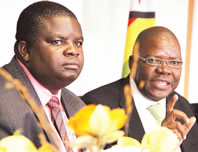ANC finalises poll candidates
Eastern Cape and the North West, party secretary general Gwede Mantashe announced yesterday.
“We are happy that the ANC candidates lists is processed (and) has been largely influenced by our people on the ground and where necessary there was political intervention to uphold the principals of our movement,” Mantashe said, addre-ssing a media briefing at the ANC headquarters in Johannesburg central.
He said the candidates lists had women in the majority.
“Not only do the candidates lists from various provinces largely reflect gender balance, continuity, generational mix and new faces, but they show how rigorous our processes have been.”
The gender balance is 51.6 percent in Gauteng and 58 percent are people who were in local government before. Women ward candidates are at 41 percent with the youth represented by 12 percent.
“In the Northern Cape, average gender representation is 52 percent, continuity is 42,4 percent and youth representation 24,8 percent.”
Limpopo gender representation is at 51,07 percent, continuity at 38,5 percent.
KwaZulu-Natal has 48 percent women representation.
“We have fallen short in gender balance in KwaZulu-Natal because there (are) challenges.
“Especially in (the) far north of KwaZulu-Natal getting women elected into positions is very difficult.” Western Cape has a 50 percent women representation.
Mpumalanga also had 50 percent of women representation and 48 percent continuity which was the same as in the Free State.
“Eastern Cape and North West have been given until Wednesday to finalise the list.”
Four party members in the Alfred Nzo region, Eastern Cape launched a lawsuit against the ANC in the past week, in a dispute over a candidate list. The group approached the Mthatha High Court on Tuesday, submitting that the decision to hold the list conference on Tuesday prior to the verification of properly constituted ANC branch meetings, had been illegal. – AFP.










Comments